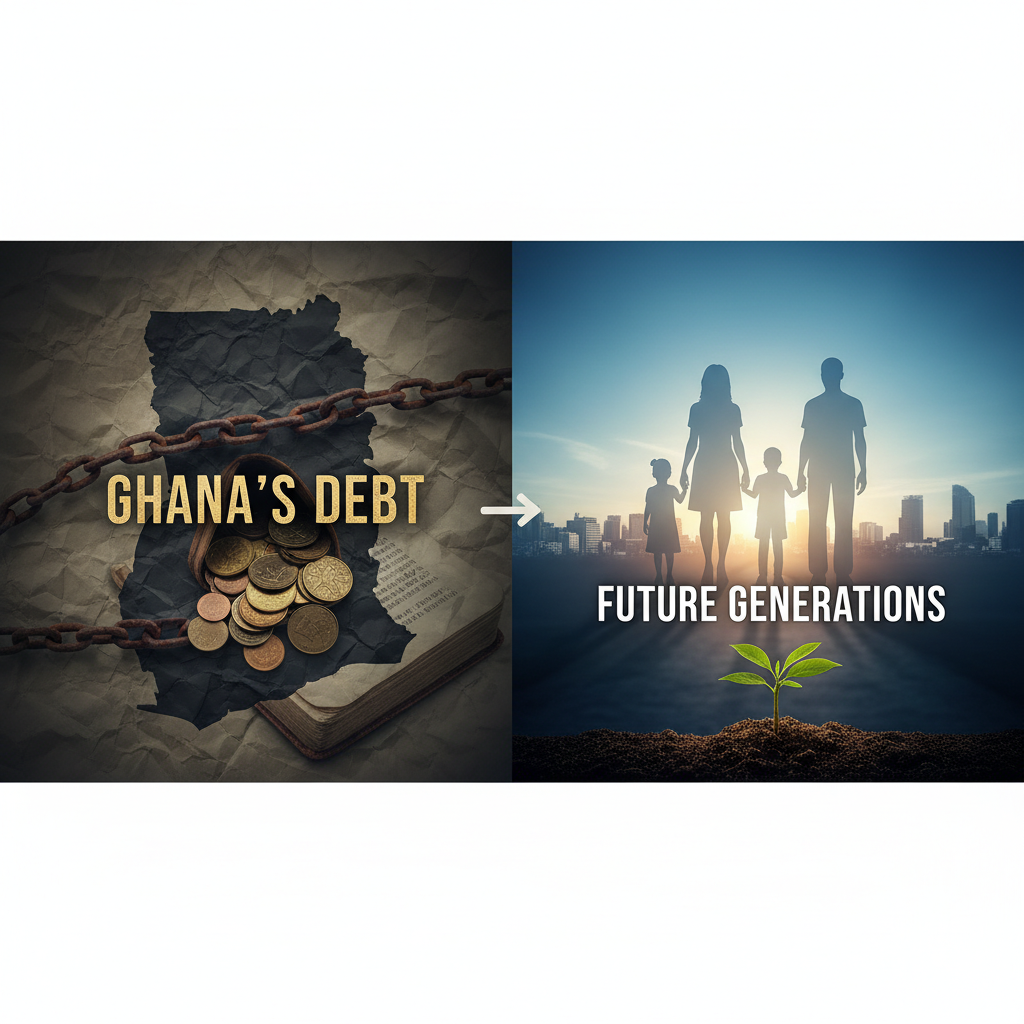Introduction: Why Ghana’s Debt Matters
Ghana’s debt has emerged as one of the most serious economic challenges facing the nation, touching the lives of each citizen either directly or indirectly. Excessive borrowing, mismanagement of the economy, and outside financial pressure have created a mounting debt crisis that has an impact on everything from inflation to government services. The citizens ought to be concerned because the effects of out-of-control debt include increased taxation, less government expenditure on essential services, and a poor financial future for the younger generations.
Ghana’s National Debt in 2024: The Numbers
Based on the 2025 Budget Statement and Economic Policy, Ghana’s total public debt stock has reached a critical level. As of the latest data:
- Total public debt: [GH¢726.7 billion (US$49.4 billion)]
- External debt component: [GH¢416.8 billion (US$28.3 billion)]
- Debt-to-GDP ratio: [61.8%]
These figures show that Ghana’s debt has surpassed sustainable levels, triggering concerns about repayment ability and economic stability. The government has been forced to enter into debt rescheduling arrangements with external creditors and the IMF in a bid to manage the crisis.
How Ghana’s Debt Affects Everyday Life
- Inflation and Cost of Living
As debt levels rise, the government often prints more money or borrows further, leading to inflation. This directly affects the prices of food, fuel, and essential commodities, making life more expensive for ordinary Ghanaians.
- Education Sector
High debt levels mean limited funds for education. Public schools may face budget cuts, delayed salary payments for teachers, and inadequate infrastructure development.
- Healthcare System
Government hospitals and clinics rely on state funding, and with more money going into debt servicing, resources for medicines, medical equipment, and healthcare workers’ salaries are constrained.
- Employment and Business Growth
When the government is highly indebted, it has fewer funds to invest in job-creating projects. This affects unemployment rates and makes it harder for businesses to thrive.
Long-term Consequences for Future Generations
If Ghana’s debt continues to grow unsustainably, future generations will face:
- Higher Taxes: Future governments may need to impose higher taxes to manage the debt.
- Limited Investment in Infrastructure: Less funding will be available for new roads, bridges, and schools.
- Increased Borrowing Costs: International lenders may view Ghana as a high-risk borrower, increasing interest rates on future loans.
- Economic Instability: Persistent debt crises can lead to currency devaluation, investor uncertainty, and financial instability.
Potential Solutions to Ghana’s Debt Crisis
- Government Policies
- Strengthening fiscal discipline to control excessive borrowing.
- Increasing revenue through tax reforms without burdening low-income citizens.
- Expanding local industries to reduce reliance on imports and generate foreign exchange.
- Strengthening fiscal discipline to control excessive borrowing.
- International Cooperation
- Negotiating better loan terms with international creditors.
- Seeking debt relief programs where applicable.
- Strengthening trade partnerships to boost exports.
- Negotiating better loan terms with international creditors.
- Individual Actions
- Encouraging financial literacy to help citizens manage money wisely.
- Supporting local businesses to reduce Ghana’s dependence on imports.
- Advocating for government accountability in public spending.
- Encouraging financial literacy to help citizens manage money wisely.
The Role of BudgIT Ghana
BudgIT Ghana plays a crucial role in promoting financial transparency and accountability. Our work includes:
- Analysing government spending and budget allocations.
- Educating citizens on economic policies and their impact.
- Advocating for responsible borrowing and sustainable debt management.
What Citizens Can Do
Ghana‘s debt issue concerns all citizens, and the journey towards transformation begins with information and action. You can also be a part of it by following BudgIT Ghana (@BudgITGhana) on social media for financial literacy, participating in our citizen engagement initiatives, and reporting cases of public fund abuse. You can also utilize our open data portals to monitor government expenditures and request accountability. Let us collectively build a Ghana where public funds are efficiently managed to benefit the people.
- Stay informed: Follow economic news and government budget reports.
- Engage in advocacy: Support organizations like BudgIT Ghana that push for transparency.
- Hold leaders accountable: Demand responsible financial management from elected officials.
- Make smart financial choices: Reduce personal debt and invest in Ghanaian businesses.
Conclusion
Ghana’s debt crisis is a national challenge that requires collective action. While the government must adopt sustainable policies, citizens must also stay engaged and advocate for change. The future of Ghana’s economy depends on the steps taken today to manage debt effectively and ensure long-term prosperity.
